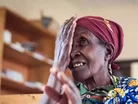Welcome to the health-tech revolution

It is a little known fact that diabetes is one of the biggest causes of poor vision. With the condition on the rise globally, associated eye problems are set to grow exponentially, compounding the already endemic problem of poor vision in Africa.
Last year Africa had a diabetic population of 14.2 million. At least a third of this group also suffer from diabetic retinopathy, a complication of diabetes which involves damage to the retina and can lead to blindness if left undiagnosed. It is estimated that by 2040 the number of diabetics in Africa will have doubled.
Poor vision and blindness is particularly prevalent in those who have had the condition for many years. With many struggling to access specialist medical support across the continent, diabetics face a bleak diagnosis.
However, there is a much wider number of people suffering from poor vision across Africa. There are a staggering 2.5 billion people worldwide who suffer from vision problems and lack access to vision correction, with approximately 26.3 million people in Africa living with some form of vision impairment.
Improving universal access to eye care across the African continent would lead to enormous social and economic benefits. PwC has estimated that for every dollar of investment there is a $4 return, and as many as two in three cases of blindness are preventable or treatable.
By providing those with poor vision with the eye care solutions they so desperately need, we can improve not only their well-being and quality of life. We can also help to unleash vast untapped economic potential, by helping people to access education and thrive in work and life.
Fortunately, real change for millions of people could be on the horizon. Ground-breaking new healthcare innovations are emerging from within Africa’s tech sector, with the potential to improve vision.
Some of the most promising solutions involve improving communication between patients in remote areas and healthcare professionals, using pioneering smartphone apps. Take Vula Mobile, which won the Clearly Vision Prize - a competition that I launched this year as part of my campaign, Clearly, to improve universal access to vision.
Vula’s story is born out of grass-roots ingenuity. Dr William Mapham developed the app when he was working at a remote eye clinic in Swaziland and saw the potential to connect eye care specialists with primary healthcare workers who engage with patients in rural areas. By offering a referral service to specialist ophthalmologists and a secure medical chat, Vula enables patients to be processed and treated faster than ever.
Vula belongs to a new breed of med-tech companies in Africa, with enormous potential to improve fast and accurate access to diagnosis. Another example is Peek Vision. Based in Kenya, the company’s leading product, Peek Retina, clips over a smartphone’s camera and allows primary healthcare staff to view the patient’s retina. Among other eye conditions, this can help to identify problems caused by high blood pressure and diabetes.
The technology being developed by Peek is part of Kenya’s vibrant tech scene. In 2015 22 percent of all start-ups floated on VC4Africa were from Kenya, and there has been talk of an emerging ‘Silicon Savannah’. It is on the shoulders of these developments that universal access to vision will be achieved.
However, there is a risk that ‘the urgent’ will forever overshadow ‘the important’, as a focus on more pressing, life-threatening epidemics keeps non-communicable health issues like diabetes and poor vision at the bottom of the global agenda.
Today is World Diabetes Day, which provides an important opportunity to shine a spotlight on this growing epidemic and its lesser known complications.
In the lead up to 2040 tackling poor vision is essential. We must push this up the priority scale. We cannot afford to ignore the detrimental impact it has on people’s lives, and broader growth and productivity in developing nations. However, it is fantastic to see that home-grown innovative technologies are set to play such a transformative role in overcoming Africa’s greatest health challenges.
James Chen is founder of Clearly, a global campaign that seeks to address the challenge of poor vision, and accelerate a revolution in eye care
African Business Review’s November issue is now live.
Stay connected: follow @AfricaBizReview and @WedaeliABR on Twitter.
African Business Review is also on Facebook



